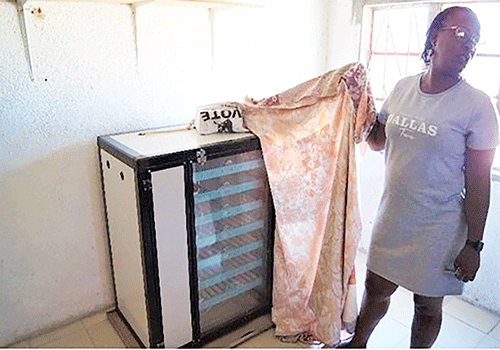Yvonne Howaes is a full-time communal farmer and enthusiastic upcoming agribusiness woman, who is currently farming on Farm Houmoed in the Khorixas area of the Kunene region.
She owns a vegetable garden and currently plants lucerne, sunflower, barley, chilli pepper, spinach, onions, watermelons, maize, moringa tree and aloe vera. She also intends to plant
grass.
Howaes participated in the Agribank Women and Youth Training, funded by the Deutsche Gesellschaft fur Internationale Zusammenarbeit’s (GIZ) Farming for Resilience project (F4R) in 2021, where she gained knowledge on crops, poultry, piggery and fodder production for her livestock.
Being a conventional small-stock farmer, she reflected on how she is now able to grow food for her family as well as her small stock. She also owns dual-purpose chickens, such as Koekoeks, Australorps and some quails, as well as a few ducks and rabbits.
She currently sells her produce to locals and is negotiating with retailers, such as Choppies, to be able to supply her
produce.
She proudly mentioned that 90% of
her family’s food consumption comes from her garden – and as such, she manages to put food on the table for her children.
In the future, she wants to focus on supplying chicks, pigs and sheep.
Howaes has also acquired an incubator to hatch eggs and plans to sell day-old chicks to interested farmers in the community.
She, however, faces challenges, including water supply for her garden, lack of shade netting, elephants and wild birds that eat her plants.
Howaes urged all women to stand up and work for themselves and not rely on men for sustenance.
Another beneficiary is Daniel Kauapirura, a communal farmer in the Otjiwarongo village, Epukiro area of the Omaheke region.
He started as a livestock farmer and ventured into crop production in 2013, following crop production training he received at the Tsumis Agricultural Training College at the time.
In 2021, he participated in Agribank Women and Youth Training funded by the GIZ Farming for Resilience project (F4R) training, focusing on crop and horticulture production, poultry production, integrated farming, fodder production, financial management and recordkeeping.
Kauapirura affirmed that the training expanded his knowledge of dryland crop and horticulture production and learnt that he needed to focus on one or two profitable products.
In terms of poultry production, he alluded to the fact that he started with 300 layers but lost them all due to a lack of knowledge prior to the training. Since the training, he acquired 600 birds and has incurred fewer losses. He currently has 450 layers.
Moreover, he has learnt the benefits of integrated farming and ventured into lucerne and fodder production to feed existing animals, and uses animal manure in the planting of crops and vegetables.
He also managed to plant maize, beans, pumpkin, peanuts, spanspek, green pepper and tomatoes.
However, inadequate water supply and the cost of chicken feed have posed a significant challenge in his farming journey.
To generate income, Kauapirura markets his small stock to speculators and sells the horticulture products and eggs to teachers, cultural clubs and locals, while the crops serve as animal feed.
In fact, whilst we were interviewing him, a couple arrived to buy a tray of 30 eggs. He remains truly thankful for the training.
– Agribank


